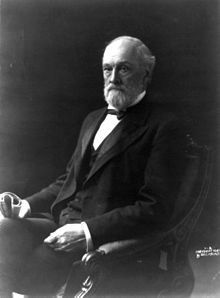Orville H. Platt
| Orville H. Platt | |
|---|---|
 |
|
|
United States Senator from Connecticut |
|
|
In office March 4, 1879 – April 21, 1905 |
|
| Preceded by | William H. Barnum |
| Succeeded by | Frank B. Brandegee |
| Member of the Connecticut House of Representatives | |
|
In office 1864 1869 |
|
| Personal details | |
| Born |
Orville Hitchcock Platt July 19, 1827 Washington, Connecticut |
| Died | April 21, 1905 (aged 77) Meriden, Connecticut |
| Nationality | American |
| Political party | Republican |
Orville Hitchcock Platt (July 19, 1827 – April 21, 1905) was a United States Senator from Connecticut. Platt was a prominent conservative Republican and by the 1890s he became one of the "big four" key Republicans who largely controlled the major decisions of the Senate, along with William B. Allison of Iowa, John Coit Spooner of Wisconsin and Nelson W. Aldrich of Rhode Island.
Born in Washington, Connecticut, he attended the common schools and graduated from The Gunnery in Washington. He studied law in Litchfield, and was admitted to the bar in 1850, commencing practice in Towanda, Pennsylvania. He moved to Meriden, Connecticut in 1850 and continued to practice law. He was clerk of the Connecticut Senate in 1855 and 1856, Secretary of the State of Connecticut in 1857, and a member of the State senate in 1861 and 1862. He was a member of the Connecticut House of Representatives in 1864 and 1869, and served as speaker in the latter year. The former Platt National Park in Oklahoma (since 1976 part of the Chickasaw National Recreational Area) was named for him.
Platt was state's attorney for New Haven County, 1877 to 1879, and was elected as a Republican to the U.S. Senate in 1879. He was reelected in 1885, 1891, 1897 and 1903, and served from March 4, 1879, until his death. While in the Senate, he was chairman of the Committee on Patents (Forty-seventh through Forty-ninth and Fifty-fourth and Fifty-fifth Congresses) and a member of the Committees on Pensions (Forty-seventh Congress), Territories (Fiftieth through Fifty-second Congresses), Cuban Relations (Fifty-sixth through Fifty-eighth Congresses), and the Judiciary (Fifty-eighth and Fifty-ninth Congresses). By the 1890s, Platt's influence in the Senate swelled to the point that, eventually, he was known as a member of the "Senate Four" who largely controlled the Senate, along with John Coit Spooner, William B. Allison and Nelson W. Aldrich. Because of his votes against the Sherman Anti-trust Law, the Eight-Hour Labor Act, and the Anti-Injunction Bill, Platt was denounced by the labor organizations and was considered a reactionary. He was an earnest advocate of the abolition of secret executive sessions of the Senate.
...
Wikipedia
